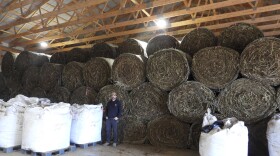Migrant workers who come to Kentucky under the H2A visa program are a critical part of the agricultural workforce. The Bluegrass State ranks seventh among the 50 states for the number farm workers who come under this visa, according to the Office of Foreign Labor Certification. Phil and Jan Holliday's farm in Logan County has two workers from Mexico who have been coming for more than two decades, and they’re bringing the next generation.
The rows of green tobacco stretch to the horizon under a clear blue Kentucky sky. It’s midday and it’s hot – around 90 degrees.
Juan Aldana Regoza steps down from the tractor to talk with interpreter Mayra Duncan from the Logan County Migrant Education Program. Duncan asks the 49-year-old Regoza how long he’s been working on this farm.
“…21…21 seasons.” “Why do you keep coming back?” “He says he’s very pleasant to work with…Phil.”
“Phil Holliday I live in south Logan, close to Olmstead, Kentucky and I raise 77 acres of tobacco.”
Holliday has been farming for 40 years on these acres in Logan County about 15 miles north of the Tennessee border. He says he used to hire local people to work on his tobacco farm.
“Guys I grew up with, went to school with, first. Then as they got older, started getting the H2A workers.”
Holliday is one of 841 Kentucky farmers who requested workers under this temporary visa for the 2017 crop year.
“Not any Americans want to work in a tobacco patch. The H2A workers do all the tobacco work, pretty much for the most part, unless it’s family.” “Is it difficult, is that why?” “No, not really, it’s just hot and dirty.”
Holliday has 16 H2A workers this year. Juan Regoza is here with son and two nephews. Another worker has also been coming for 21 years.
Phil’s wife, Jan Holliday, says the farm family and the H2A workers develop a relationship.
“The guys that have been coming for 21 years we’ve certainly gotten to know and trust them. One used to put Joe, our son on the school bus in the mornings, because as a teacher, I had to leave early. So, you know, we definitely have developed a relationship and admire and respect these guys who come and work so hard to take care of their families.”
This is the eighth year Edgar Sanchez is working on the Holliday farm. Sanchez is 30 years old, married with four children. He tells Mayra Duncan he’s grateful for seven months of steady work in Kentucky, because he earns more than he can earn in Mexico.
“He works over there but it’s temporary jobs, so he can be picking avocados, sugar cane.”
The H2A workers are paid a minimum of $10.92 an hour and provided with housing and transportation.
Jeff Gatewood is coordinator of the H2A program in Kentucky and says the farmer, or an agency representing farmer, initiates the process.
“They have to attempt to try to find U.S. workers before they get approved to go through the immigration process to bring in foreign workers with visas.”
Gatewood says it’s a pretty broad recruitment effort.
“They’re required to advertise in three different states. One being in their general area of intended employment, and then in a neighboring state, and what they call a supply state, which for Kentucky is Florida.”
Tennessee is the neighboring state where Kentucky farmers have to try to recruit workers.
Kentucky Agriculture Commissioner Ryan Quarles says the state is increasingly using the H2A program, and that follows the national trend.
“The number of H2A visas has doubled in the past five years in the United States.”
Statewide, Kentucky has about 7,500 farmworkers through the H2A visa program this crop year. That’s up from 4,800 five years ago.
Commissioner Quarles says there’s one obvious fix he’d like to see to streamline the H2A program.
“A lot of farmers use the same core groups of individuals year-after-year. It adds stability to their farming operation and predictability.”
Multi-year contracts would simplify the process for farmers like Phil Holliday who has been depending on some of his H2A workers for 21 years, and who has a relationship with these temporary workers that continues across generations.
© 2017 WKU Public Radio












